Holly & Josh (6 years)
July 9, 2020
"Our Breastfeeding Journey Starts at the only place it can, the beginning. When I peed on that stick and knew I was pregnant, I never once imagined that one day I would be breastfeeding a 6 year old!
After all the influence from our society, my own childhood and a lack of knowledge, I genuinely didn’t think it was important or any different to formula and simply decided if it didn’t work out that was that. No more was thought about it. As I progressed through my pregnancy, I felt myself leaning towards more ‘natural’ ways to labour, recover and raise our baby. So I started researching. The first thing that became clear was that I wanted to birth at home. I contacted my GP and was transferred to the ‘Eden Team’ in Poole. My midwives were incredibly nurturing and actually listened to my feelings and what I wanted. I felt safe and validated. I felt empowered. The research continued. It soon became apparent that the way we wanted to live just wasn’t what our society dictates as ‘normal’. I should add here that I have always loved education and have dedicated a large portion of my life to scientific research, so was refreshed to see data and analysis that supported the way I wanted to live and parent. This helped me make my decisions with confidence.
I immediately found a local hypno-birthing class and started attending regularly, practising at home. I know without a doubt this was why I was able to birth the way I did.
During my time at the classes, I met many other mums some first time like me others well-seasoned with their 2nd/3rd/4th etc. Every week I would listen to their stories, some of which were about breastfeeding. I was intrigued by some of their claims about feeding so once again, started researching. I learnt that biologically, anti-bodies are passed from me to baby within 20 minutes of him latching and feeding. I learnt it releases oxytocin in both the mother and baby, which helps relax and settle both of us. I learnt it helps build their immune system, which takes an average of 7/8 years to fully mature. I learnt that once the back molars descend (used for crushing nuts and seeds) at approx. 7 years old, the jaw changes shape and the child can no longer latch successfully to draw milk. So from a biological and anthropological point of view, it’s almost ‘Mother Nature’ telling us that now is the time. You no longer need this breastmilk. You can get everything you need from your food intake.
Once I was done, I knew I wanted to breastfeed for as long as possible and it would be ‘child led’ following ‘natural term weaning’ guidelines as recommended by the WHO, NHS and other breastfeeding organisations all based on decades of scientific research and analysis. There were so many other incredible things I discovered during my research I could write all day! What I didn’t realise, was the emotional and physical side to breastfeeding. There is only so much you can research. The rest is what you experience.
When Josh was born, we were at home, in a pool. I had laboured just like I had imagined it would be. I knew what to expect with my muscles, dilation, descending and crowning. I knew the best positions to labour in, knowing all of this and using breathing techniques I learnt during my birthing classes, I managed to control my adrenaline, communicate concerns to my midwives, relax as they reassured me and was aware of transition as soon as it was happening – the classic ‘I can’t do this anymore!’, which actually made me excited when I realised because I knew in a minute, my contractions would change. Which they did. As he was crowning, I reached down to catch him as he came out into the water, 3 more contractions and he was out. I had done it.
I sat back in the water with my tiny, beautiful baby. We just relaxed into each other and for a moment, nothing else mattered. My midwives rubbed him with a towel and he started crying. I laid him near my breast and let him naturally come towards my nipple. He started rooting straightaway just like I expected. I remember the feeling of him latching for the first time, the tingling as he stimulated my milk, the literal toe-curling feeling of ‘let down’, holding my breath as he slowly started to draw milk and finally relaxing into our first feed. It was incredible. I loved the smell of his hair, the feel of his tiny toes and I could not take my eyes off him.
Everyone loves to say breastfeeding is so natural. Which it is. But it doesn’t ‘come’ naturally. It’s so hidden in today’s society. It’s not normalised, so I didn’t ever really see anyone breastfeeding or have any education prior to being pregnant and everything I did learn was my own doing. As a result, I found it a struggle in the beginning. I had researched cluster feeding and knew what to expect but the reality of stinging nipples, no sleep, no autonomy anymore, no real rest, first-time mum nerves, a dairy intolerance and the diagnosis of Josh’s Severe Hypospadias, made it hard to function ‘normally’. So I rejected what society expected of me. I focused on me and Josh. What did we need? I sought support from local breastfeeding groups with experienced, trained peer-supporters, cut out dairy and stopped worrying about keeping up with societal expectations. I read up on various anthropological studies and started co-sleeping, always sticking to safe bed-sharing rules with NO exceptions. We found it to be a game changer for us – we loved it.
Josh’s nappies and feeds instantly got better, he was less windy and settled better at the breast, he was content when he came off and actually slept better meaning I could rest too.
Then another cluster feed hit us but this time I was more prepared. I accepted my baby just wanted to be at the breast, against my skin so started feeding him in his wrap which really worked for us.
It wasn’t long before we were on our way to Southampton Hospital to see a specialist regarding Josh’s hypospadias. We were told he would need 2/3 operations and that his recovery would be a journey. There was no option to not have the surgery. He just couldn’t live a ‘normal’ life without it. Once they confirmed his diagnosis and that he would definitely need an operation, I once again started my research.
It was clear that breast milk was the best thing I could continue to give him as he recovers. The operation was another year away and I believed it would help with security, attachment, pain relief (oxytocin) and obviously to help build his immune system.
During the next 6 weeks we transitioned to a whole food vegan diet and all our other complaints (eczema and tummy trouble) went away – thankfully! His feeds finally settled and our breastfeeding relationship really took off. It was at this point I realised just how much I had been struggling. As Josh’s op date approached us, breastfeeding had become ‘the norm’. I didn’t even have to think about it. We taught him the sign for ‘milk’ from birth and he would tell us when he wanted more milk than he normally had – useful for growth spurts! We never worried about how much food he was eating as he got between 70-90% of his daily nutritional needs from my breast milk so food was really just for taste, texture and fun which helped us relax too.
His 1st birthday passed and he showed no signs of slowing down! We used breastfeeding for everything; if he was hurt/scared/upset/tired/unwell/thirsty/hungry or when he just wanted to snuggle. It saved us so many times. After his op it helped both of us being able to breastfeed. As soon as he woke me and my husband were there and the nurses made sure I could breastfeed him immediately. They were so supportive and I will be forever grateful to them for taking such good care of us. During the next 2 weeks, having a catheter fitted and being in pain from the op, breastfeeding literally saved our sanity. It provided so much comfort and relief and I’m so pleased I could give him that. Thankfully, our incredible surgeon managed to do everything in the one operation. He won’t need another one now unless something goes wrong. 5 years later and he is still our happy, healthy boy and we are so, so thankful it’s gone that way. Quick shout out to our AMAZING NHS – we will be forever grateful for them.
I had encountered people before this point telling my (incorrectly) that breastmilk had no nutritional value after 6 weeks, 3 months, 6 months – basically – insert number here and claim it loses value. But once Josh had turned 1 year old, the pressure to stop breastfeeding, was overwhelming.
I was called ‘disgusting’ by my MIL – as well as from strangers. I got dirty looks and tutted at. I was asked to sit in another room to feed him, not just by family but out and about while just living our lives like at the doctor surgery. I was told repeatedly and more forcefully, that breastmilk has no nutritional value. I was told I am psychologically damaging my son. Constant questions like ‘are you ever gonna stop?!’, ‘you’ll be feeding him when he’s 18!’, ‘just give him cows milk’, ‘what will you do when he goes to school?’, comments like ‘he won’t understand boundaries’ (ironic as I was actually able to assert myself and enforce autonomy boundaries through breastfeeding). ‘Why can’t you just express?!’ (a lot of women struggle to pump the same volume of milk vs a baby attached at the breast. This is simply because a man-made pump cannot replicate a baby’s latch).
However, I think the worst comment of all was at a family wedding in front of everyone, when an uncle (not related) told me he preferred me with bigger boobs.
It was his wedding. I was stood next to his wife. I was hurt by their comments, but I had educated myself. My family was supportive. My husband wasn’t prepared to let it go and we lost relationships because of it. Society’s stigma and misinformation had worked. I had been ostracised for doing what mothers should be able to. The most basic act of feeding my child with my body. For a while, I suffered.
Josh showed no signs of slowing breastfeeding, let alone stopping, so cutting out breastfeeding to conform to society’s expectations just wasn’t an option for us. I knew the facts, I knew I was doing the best I could and so I created a new circle. I became very active regarding breastfeeding and empowering women. In doing so I met new parents like us and let everyone who didn’t support us, fall to the wayside. I felt better. I soon realised just how many other women feel this way and honestly? It’s no wonder we have one of the worst breastfeeding rates in the world. Every single woman I have met who breastfed and wanted to, has been told things like me. This has got to stop.
As he grew, I started to notice during times of specific development, he would sometimes feed more and it would slow again. Different to cluster feeding, not as intense and sometimes he wouldn’t feed for a day or two. We continued to co-sleep for the next 4/5 years and I would normally ‘dream feed’ at night. It meant Josh could help himself when he wanted and I got more sleep. This really worked for our family and we love the closeness and bond it created. Josh is now 6 and has really only in the last 2 years or so slowed/stopped feeding at night, which may seem like a long time for our society to accept, but after the research and education I’ve undertaken, it’s really not surprising and is considered ‘normal’ in many other societies.
Over the years our breastfeeding relationship has changes many times. There have periods of extreme cluster feeding, feeling ‘touched out’ – another feeling so intense I had to remove Josh from the breast and have a break. I know this is a normal part of breastfeeding and many women experience it in varying degrees. Not surprising really when you have almost no autonomy for so long! Then there have been times when he’s not fed for a week and I thought maybe he was weaning – but no!
So in a way our experience has been like the tide of the ocean. Constantly changing. No two days are the same. It’s been rough at times, we’ve weathered storms then the sky clears and it’s been completely calm and smooth sailing again. Very apt that Ann chose this spot for us. Now he’s 6, I know my time is almost done. Every time he feeds I wonder if this will be the last time. I stroke his hair and I pull him in close as I smell him. I tickle his hands and we play thumb wars. I still can’t stop looking at him. There are so many emotions that come with this final realisation; a subtle feeling of excitement, to have a little more autonomy over my own body once more, a little more ‘freedom’ if you like. A sense of achievement after everything we’ve been through. Sadness that’s it’s coming to an end and that one day we will no longer have this particular connection. And pride. Pride in myself that I knew what I wanted and no matter the criticisms that rained down on me, I persisted.
And we did it."
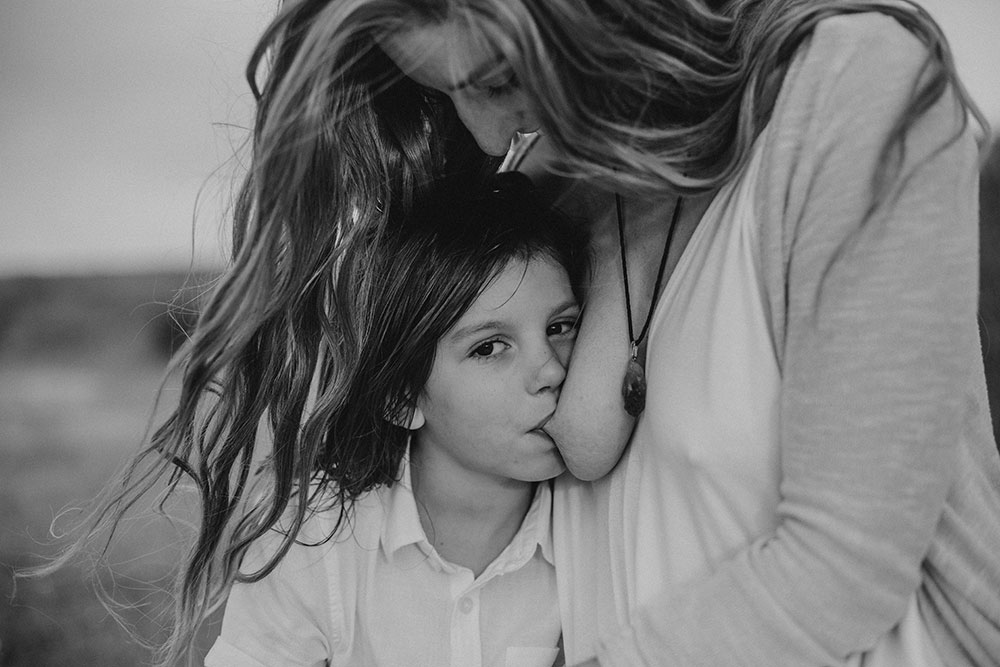
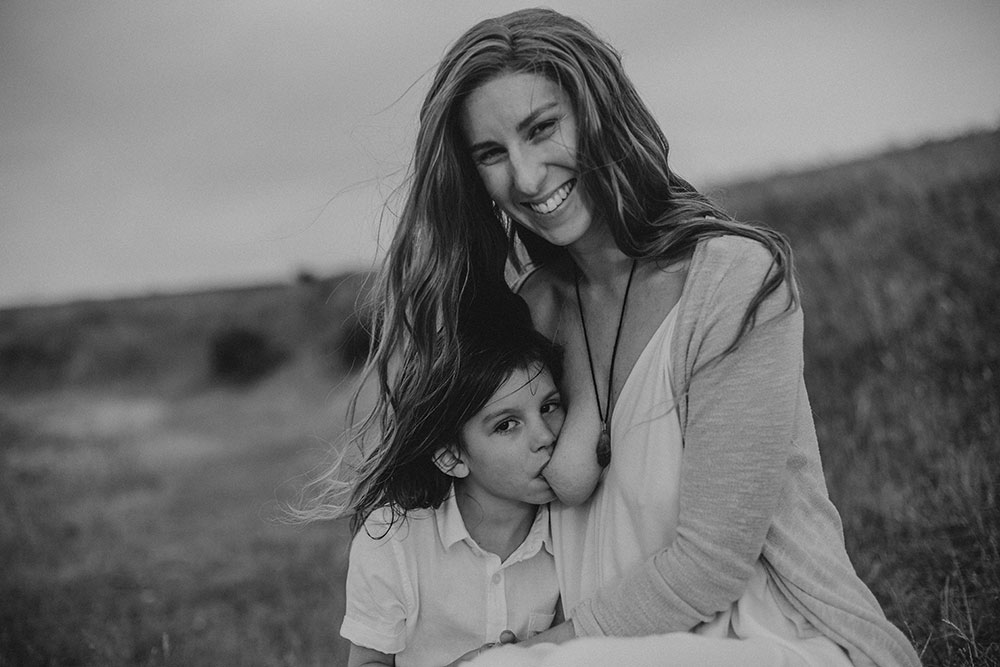
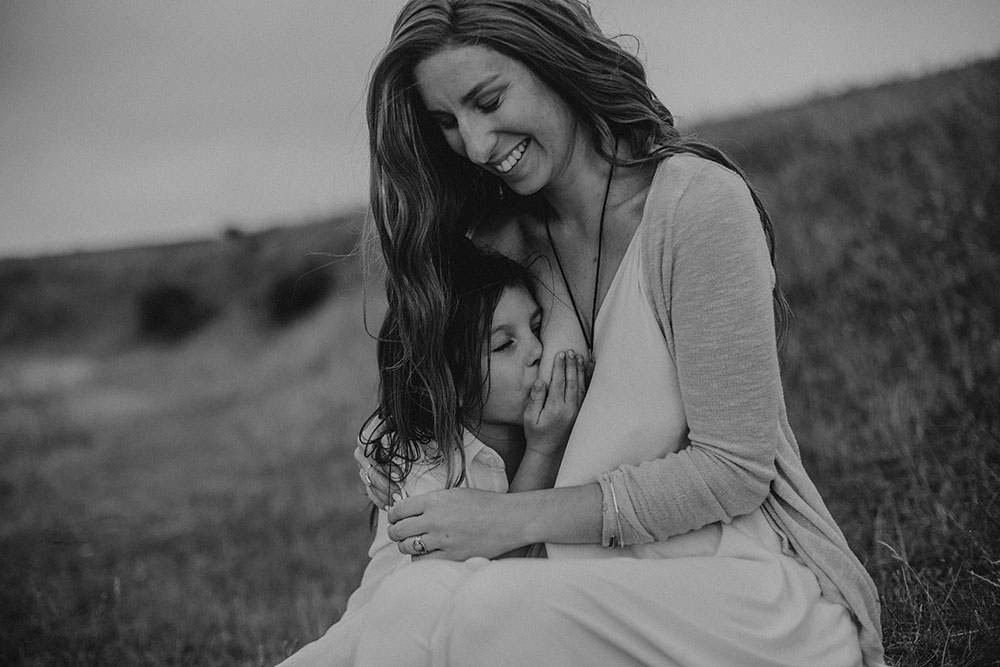
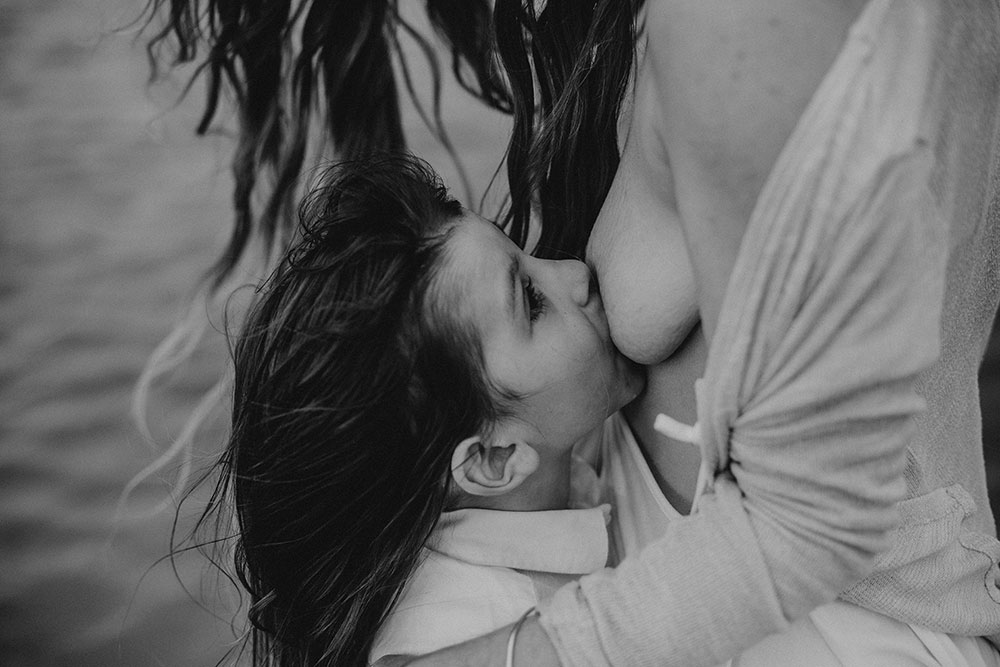
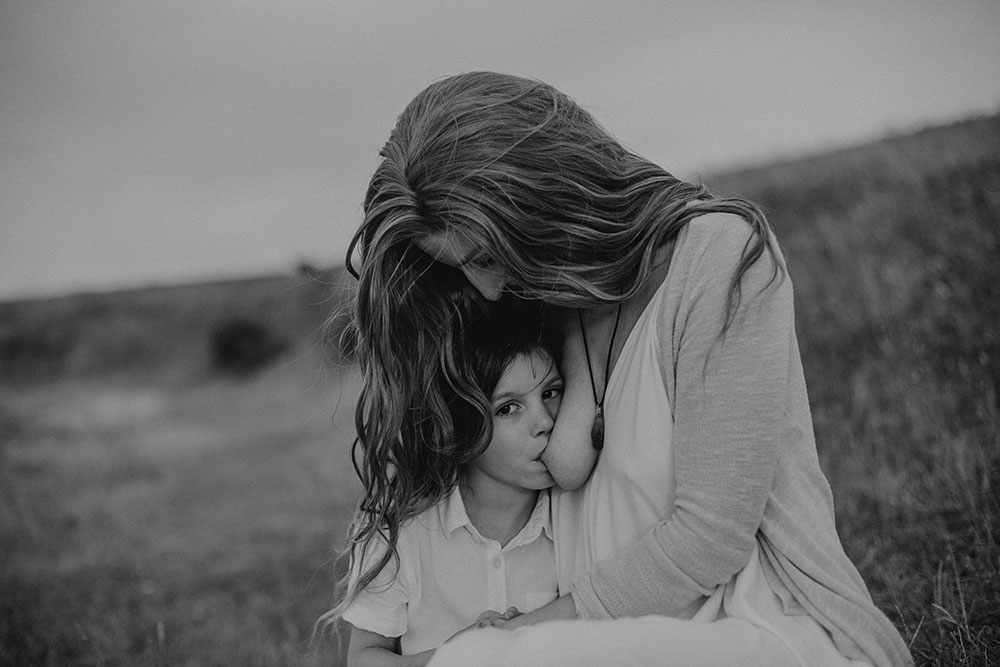
Leave a comment